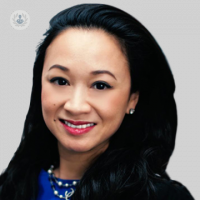Living with varicose veins: management and treatment
Written in association with:Varicose veins are enlarged, twisted and dark veins that appear on the legs and feet. Whilst they are not dangerous and very common, varicose veins can significantly affect people’s quality of life.
Miss Nung Rudarakanchana, highly experienced consultant vascular and endovascular surgeon who specialises in varicose veins, explains when people should seek medical attention and what treatment options are available.

Do varicose veins run in families?
Varicose veins do tend to run in families, pointing to a genetic cause for primary valve failure. Although research is underway, we are yet to identify many of the underlying genetic mutations.
What can be done to prevent or slow the development of varicose veins?
For most people, there is little that can be done to prevent or slow the development of varicose veins. Once the valves in the superficial veins begin to fail, the veins progressively dilate and the valves become even more inefficient. Reducing pressure in the veins can help, but it’s not practical to have your legs elevated all the time! Compression stockings may help to control symptoms in the short term, but they are rarely a practical long-term option. Where central obesity is a factor, weight loss may reduce pressure on the veins and result in some symptomatic improvement, although again, this will not reverse the appearance of varicose veins.
When should you see a doctor about varicose veins?
You should seek an opinion from a vascular specialist if you have varicose veins (tortuous enlarged veins at the surface of the leg or in the groin) or thread or spider veins (dilated fine veins in the skin). People with leg or ankle swelling will also benefit from a vascular opinion, as underlying venous reflux may be identified.
Varicose veins may be associated with symptoms of tired or restless legs, heaviness, aching or discomfort, itching and swelling, particularly after long periods of standing or at the end of the day. Some people with varicose veins develop varicose eczema, superficial thrombophlebitis or venous ulcers.
The impact of varicose veins on quality of life should not be underestimated. Many patients with varicose veins hide their legs under long clothing and avoid particular social situations in order not to have to show their legs. Having varicose veins can cause significant mental health issues, including anxiety and depression.
Can varicose veins go away on their own?
For the majority of people, varicose veins will not go away on their own. The only slight exception to this is varicose veins that appear during pregnancy; these occur due to a combination of hormone changes affecting veins and also the weight of the baby on the central veins in the pelvis. In pregnancy, varicose veins can affect the vulva and the legs; these may improve following delivery, although many women do have persistent veins following pregnancy.
What is the most popular treatment for varicose veins?
The most popular treatments for varicose veins are endovenous ablation (laser or radiofrequency), foam sclerotherapy and avulsions. It is rare now to perform vein stripping operations, which require a general anaesthetic and carry risks of bleeding, bruising, nerve injury and scarring, as well as a long recovery time. The more modern treatments are less invasive and have less risk of complications. They can usually be performed under local anaesthetic, on a “walk-in, walk-out” basis, with far shorter recovery times.
Endovenous ablation is a procedure where a needle is inserted into the underlying, or main truncal vein, and a probe is passed up inside the vein. Local anaesthetic fluid is injected around the vein to protect the surrounding tissues and then the probe is activated, producing heat within the vein (this can be achieved by laser or radiofrequency). The heat causes the vein to close, and over the following weeks and months, the body simply reabsorbs the vein. This procedure essentially treats the underlying venous reflux or “turns-off the leaking tap” that is filling the varicose veins.
For the varicose veins (lumps at the surface of the skin) themselves, these can be treated either with foam sclerotherapy injections or avulsions.
Foam sclerotherapy involves direct injection of the veins with a chemical detergent that is mixed with air to form a foam. The sclerosant causes the vein to close, and over the following weeks, the vein shrinks down until it is no longer visible.
Avulsions is a minor surgical procedure that can be performed under local anaesthetic. It involves small incisions directly over varices and hooking out of the vein, so that the veins are removed from the leg.
Microsclerotherapy is performed for thread or spider veins. This involves the injection of a liquid sclerosant directly into the veins using very fine needles.
If you live with varicose veins and would like to get them expertly checked, don’t hesitate to visit Miss Rudarakanchana’s Top Doctors profile today.



